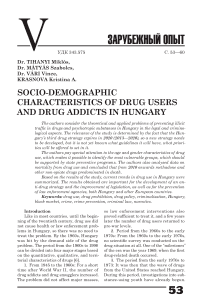Socio-demographic characteristics of drug users and drug addicts in Hungary
Автор: Dr. Tihanyi Mikls, Dr. Mtys Szabolcs , Dr. Vari Vince , Krasnova Kristina A.
Журнал: Виктимология @victimologiy
Рубрика: Зарубежный опыт
Статья в выпуске: 3 (25), 2020 года.
Бесплатный доступ
The authors consider the theoretical and applied problems of preventing illicit traffic in drugs and psychotropic substances in Hungary in the legal and criminological aspects. The relevance of the study is determined by the fact that the Hungary’s third drug strategy expires in 2020 (2013-2020), so a new strategy needs to be developed, but it is not yet known what guidelines it will have, what priorities will be offered to set in it. The authors pay special attention to the age and gender characteristics of drug use, which makes it possible to identify the most vulnerable groups, which should be supported by state preventive programs. The authors also analysed data on mortality from drug use and concluded that from 2010 onwards methadone and other non-opiate drugs predominated in death. Based on the results of the study, current trends in drug use in Hungary were summarized. The results obtained are important for the development of an anti-drug strategy and the improvement of legislation, as well as for the prevention of law enforcement agencies, both Hungary and other European countries.
Drug use, drug prohibition, drug policy, criminalisation, hungary, black market, crime, crime prevention, criminal law, narcotics
Короткий адрес: https://sciup.org/14119422
IDR: 14119422 | УДК: 343.575
Список литературы Socio-demographic characteristics of drug users and drug addicts in Hungary
- A szert feltehetően kínai laborokban állítják elő. Available at: https://hvg.hu/itthon/20200901_bika_dizajnerdrog (accessed 03.10.2020).
- Flacks, S. (2019) Making drug harms: Punishments for drugs offenders who pose risks to children. European Journal of Criminology, vol. 16, issue 6, pp. 652—670. doi.org/10.1177/1477370818775291
- Fürst Zsuzsanna, Wenger Tibor (ed.) (2010) A kábítószer-abúzus orvosi, jogi és társadalmi vonatkozásai, Budapest: Medicina Könyvkiadó Zrt.
- Kaló, Zs., Szabó, R., Bálint, R., Péterfi, A., Port, Á., Szatmári, D., Tarján, A., Horváth, G. (2018) Az új pszichoaktív szerek monitorozása kulcsszakértők bevonásával Magyarországon 2017—2018-ban. Nemzeti Drog Fókuszpont. Kutatási beszámoló, Kézirat.
- Kobets, P. N., Krasnova, K. A. (2020) International law enforcement cooperation in countering illicit drug trafficking. Proceedings of the Legal Science in the 21st Century: Current Problems and Prospects for Their Solutions. A collection of scientific articles based on the results of the fourth round table with All-Russian and international participation (Shakhty, Rostov region, April 29—30, 2020), Moscow: KONVERT, pp. 127—129.
- Lévai, Miklós (1991) A kábítószer-probléma és a bűnözés összefüggései. Miskolc: Magyar Tudományos Akadémia.
- Mátyás, Szabolcs (2018) A szervezett bűnözés kriminálgeográfiai vizsgálata. Proceedings of the Nemzetközi jellegű szervezett bűnözés nyomozásának kutatása információáramlási szempontból I (ed. Frigyer László), Budapest: Nemzeti Közszolgálati Egyetem Rendészettudományi Kar, pp. 134—168.
- Monica J. Barratt, Judith Aldridge. No magic pocket: Buying and selling on drug cryptomarkets in response to the COVID-19 pandemic and social restrictions. International Journal of Drug Policy, 31 July 2020, p. 102894. doi.org/10.1016/j.drugpo.2020.102894
- Nemzeti Drog Fókuszpont (2018) 2018-as ÉVES JELENTÉS (2017-es adatok) az EMCDDA számára, Magyarország: REITOX. Available at: http://drogfokuszpont.hu/wp-content/uploads/EMCDDA_jelentes_2018_HU.pdf (accessed 03.10.2020).
- Paksi, B., Magi, A., Felvinczi, K., Demetrovics, Zs. (2015) Drogfogyasztás a magyarországi felnőtt népesség körében — a 2015. Évi “Országos Lakossági Adatfelvétel Addiktológiai Problémákról” (OLAAP 2015) elsőeredményei. Proceedings of the Magyar Addiktológiai Társaság X. Országos Kongresszusa (Siófok, November 26—28, 2015), p. 53. Available at: http://www.mat.org.hu/doksi/2015/Absztraktfuzet_MAT_X_2015.pdf (accessed 03.10.2020).
- Romposné, Éva (2017) Designer drog — új pszichoaktív anyag — kábítószer. A terület jogi szabályozásának a változása, hiányosságai és azok hatása a vegyészszakértői tevékenységre. Doktori Műhelytanulmányok: A jogtudomány sajátossága, Győr: Széchenyi István Egyetempp, pp. 285—295.
- Sivadó, Máté (2017) Jelenkori drogpolitika Magyarországon és Európában, tengerentúli kitekintéssel. Proceedings of the Studia Doctorandorum Alumnae : Válogatás a DOSz Alumni Osztály tagjainak doktori munkáiból (ed. Szabó Csaba), Budapest: Pytheas Kiadó, pp. 11—265.
- Tihanyi, Miklós (2009) Rendőri intézkedések kábítószer-fogyasztás esetén. Proceedings of the Rendészeti Ismeretek a kábítószer-problémával kapcsolatban (ed. Rácz Jenő), Budapest: ETO-Print Nyomdaipari Kft, pp. 324—363.
- Zhesterov, P. V. (2020) Prospects of economy of criminal repression members in illegal drug trafficking in the CARICC member states, International Criminal Law and International Justice, no 6, pp. 12—15.
- Zsadányi, Zsuzsa (2012). A drogfogyasztás alakulása Magyarországon. Available at: http://mipszi.hu/cikk/130309-drogfogyasztas-alakulasa-magyarorszagon (accessed 03.10.2020).
- Ürmösné Simon, Gabriella (2018) Drug abuse. In: Technical English for officers, Budapest: Dialóg Campus Kiadó, pp. 27—51.


